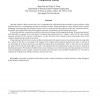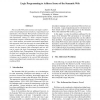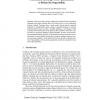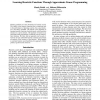236 search results - page 14 / 48 » Learning Teleoreactive Logic Programs from Problem Solving |
144
Voted
OPODIS
2003
15 years 3 months ago
2003
Detecting whether a finite execution trace (or a computation) of a distributed program satisfies a given predicate, called predicate detection, is a fundamental problem in distr...
108
click to vote
WEBI
2007
Springer
15 years 8 months ago
2007
Springer
The size of the Web and its increase rate made it cumbersome to locate high precision results to a requested piece of information. The Semantic Web provides a framework and a set ...
113
click to vote
ICANN
2009
Springer
15 years 6 months ago
2009
Springer
Neural networks and other sophisticated machine learning algorithms frequently miss simple solutions that can be discovered by a more constrained learning methods. Transition from ...
AIPS
2008
15 years 4 months ago
2008
Planning problems are often formulated as heuristic search. The choice of the heuristic function plays a significant role in the performance of planning systems, but a good heuris...
109
click to vote
AIIA
2007
Springer
15 years 8 months ago
2007
Springer
Logic Programs with Annotated Disjunctions and CP-logic are two different but related languages for expressing probabilistic information in logic programming. The paper presents a...




